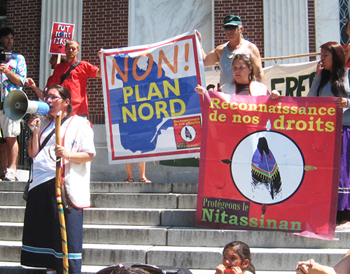
The conference, taking place from July 29-30, involves closed-door discussions on transportation, trade, energy development and climate change. Activists protested the conference’s exclusivity and the major dams, oil pipelines, highways and other infrastructure and energy projects focused on at the meeting.
“It is really good that people are coming here from all over the region because so many of these issues, especially with the environment, don’t stop at state or national lines,” environmental writer and activist Bill McKibben told Toward Freedom.
Indeed, many of the speakers and organizations at the convergence emphasized how all of their struggles are connected, from movements against plans for the Canadian tar sands oil pipelines to the decades-long struggle to shut down Vermont Yankee. A common thread throughout Sunday’s activities was the need to defend human and environmental rights in the face of regional extractive industries and energy projects, plans advocated by many of the participants in the conference.
 Elyse Vollant, an Innushku woman from the Maliotenam indigenous community in Quebec traveled to Burlington as part of an Innu First Nations Delegation to protest Hydro Quebec and Plan Nord, a multi-billion dollar plan involving four massive hydroelectric dams, spillways, dikes, canals and reservoirs which Vollant says will destroy the rivers and land in her region – all to produce electricity sold in Vermont and elsewhere.
Elyse Vollant, an Innushku woman from the Maliotenam indigenous community in Quebec traveled to Burlington as part of an Innu First Nations Delegation to protest Hydro Quebec and Plan Nord, a multi-billion dollar plan involving four massive hydroelectric dams, spillways, dikes, canals and reservoirs which Vollant says will destroy the rivers and land in her region – all to produce electricity sold in Vermont and elsewhere.
“I am here for the defense of the Nitassinan [our land] for our future generations because now [Quebec’s political leaders] are destroying the entire territory,” she explained as children from Maliotenam stood around her. Vollant said that the energy plans were developed without the approval of her indigenous community. “Plan Nord it will destroy the Nitassinan land and Hydro Quebec will damage the rivers.”
She traveled all the way to Burlington with others from her community “because it’s here that they want to sell the hydro-electricity that is from our territory.” (For more on her struggle, see this article.) When giving a speech on the steps of Burlington’s City Hall, Vollant said, “We are calling on all people to help defend the earth.”
Others from around the region, from Quebec to Massachusetts, gave speeches on the steps of City Hall Park on Sunday afternoon, describing their shared motives for protesting the governors’ convention.
Alicia Maddox, from the Vermont Workers’ Center and Vermont Parents United, said she was participating in the day’s events in part because of her five children, “I am deeply concerned about the future they will inherit.”
Maddox quoted from the Vermont Workers’ Center call to action on the conference: “The people of New England and Eastern Canada will no longer settle for the crumbs that fall from the table upon which corporations feast, because we recognize that it is the feast — not the crumbs — that belongs to us, and there is plenty to share, once we are all at the table.”
Montreal student organizer Antoine, of the CLASSE organization, spoke of the current student movement in Quebec, which he said was inspired in part by other similar struggles against austerity measures in Greece, Spain, Argentina and the US, with Occupy. “This shows that in the struggle against neoliberalism, we are not alone,” he told the crowd.
As the march left City Hall Park to weave around the city on its way to the Governors’ Convention held at the Hilton hotel, Antoine told Toward Freedom, “Our struggle is about more than just student tuition. It’s about changing a whole system.” He talked about how the political leaders of Quebec are slashing public spending while extracting resources that impact indigenous people. “It’s important to resist universally to problems that are universal.” As we finished talking, the boisterous march turned up Church Street while marchers cheered, “Burlington to Montreal, education is for all!”
People of all ages participated in the lively march, which included diverse cheers, dancing and ongoing music from Burlington’s Brass Balagan band. Many of the participants banged pots and pans in an act of solidarity with the “casseroles” widely used in Quebec’s student movement. After an impromptu dance party in front of the Hilton, a number of cheers were lodged against the guarded hotel. The march then continued to Battery Street Park where food from Food Not Bombs was distributed, and what was deemed the “world’s largest human oil spill” was organized.
The human oil spill involved hundreds of people dressed in black clothing and lying down in front of the governors’ convention in an act of protest against the tar sands oil pipelines, which would go through New England. The black-clad activists spread across the sidewalk and road in the hot July sun singing, “This Land is Your Land.”
McKibben, speaking to the crowd before the oil spill moved to the hotel, said he believed protests such as this would help prove to governors that they are “biting off more than they can chew” with the tar sands pipelines. He positioned the activities in Burlington alongside other national actions and protests against the petroleum and mining industries, saying “If they are going to take away our planet and our future, we’re going to take away their money.”
Later in the afternoon, dozens of activists blocked convention delegates from leaving the hotel for a dinner at Shelburne Farms. Police in riot gear forcefully dispersed the activists using rubber pellets, allowing the buses to pass. Activists have denounced the unnecessary use of violence against the peaceful protesters.
Avery Pittman, the Media Spokesperson for the Welcoming Committee which helped to organize many of the day’s activist events surrounding the conference, spoke to Toward Freedom of the motives behind the action to block the buses. “Organizers felt like we had not seen to or talked to any of the governors at all yesterday, they were prioritizing their business over the people who are being affected by these decisions. They didn’t address us in any way yesterday. That was motivating the action to impede the buses.”
As far as the violence used by the police against the protestors, Pittman said, “I think it was really surprising for the protesters and activists there to be met with such an armed police force in riot gear and with dogs. The police were even pointing their guns at the media who were there. It was just an incredible surprise that the police escalated this while everything the protesters were doing was non-violent.” Pittman said that “the relationship between the organizers and the police have not been antagonistic. There have been ups and downs, but the sentiment among organizers was that this was not normal for Burlington, and it has generated a lot of shock and surprise.”
The diversity of activities, demands, actions and representation from many movements and organizations underlined the interconnectedness between struggles throughout the region and the urgency of their demands.
As Chris Williams of the Vermont Yankee Decommissioning Alliance told the crowd, “We stand with everyone here today because our fight is the same.”
***
Benjamin Dangl is the editor of the Burlington-based TowardFreedom.com, a progressive perspective on world events, and is the author of Dancing with Dynamite: Social Movements and States in Latin America, (AK Press).
